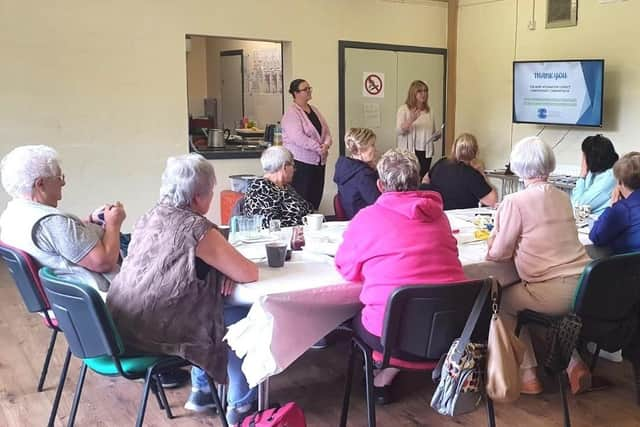Rising cost of living is ‘increasing the cost of dying’
and live on Freeview channel 276
Compassionate Communities NI has highlighted how increasing inflation and the extra costs incurred while living with a life-limiting, terminal illness are having deep consequences for many across the city and area.
Research has shown that in 2019, one in seven people in Northern Ireland died in poverty. Derry has the second highest figure on the list for those dying in poverty, both in people of working age and pensioners. Over a quarter - 28% - of working age people who die in Derry die in poverty.
Advertisement
Hide AdAdvertisement
Hide AdIt is worth noting that these stark figures were from before the Covid 19 pandemic and the cost of living - and dying - substantially increased.


Compassionate Communities NI says they will only get worse and is supporting a petition launched by Marie Curie UK, which is calling on the government to give ‘all dying people their State Pension, no matter their age; protect them from soaring energy bills and to support dying parents with childcare costs.’ Marie Curie NI is also calling for the Warm Home Discount Scheme and Winter Fuel payments to reform criteria to include people of working age who are terminally ill.
Kathleen Bradley, Community Engagement Facilitator with Compassionate Communities NI, pointed out how a diagnosis of a terminal illness and living with it can increase costs in ‘all encompassing’ areas, including in electricity, heating and food. A diagnosis also leads to reduced working hours or having to give up a job, meaning less money is coming in to the home. Research has also shown that in the UK, up to 600 carers a day leave their employment to care for someone who is terminally ill.
“Amid all the talk of the cost of living, there is an invisible community here, whose costs are as high, if not higher, because of their needs due to ill health. If you think of someone who is maybe in a hospital bed, at home and the bed is plugged in.
Advertisement
Hide AdAdvertisement
Hide Ad“You can’t unplug that and it is using electricity. If you are having certain treatments or certain conditions, it can mean that if you are cold, you are sore - so you can’t just turn off the heating and for someone with a life-limiting, terminal illness, that should not be expected of them.”
Kathleen stressed that, ‘once you get the news that you have a condition that cannot be cured, we as a society, should be doing everything we can to help you make memories with those who are important to you. That should be your number one priority. Our government should be helping people so that they do not have to worry about finances in the time they have left. We need interventions that make a real, practical difference to those in their final years and months of their lives.”
Kathleen outlined how, for many who want to make memories with their loved ones, soaring costs mean that is not always possible.
“Sometimes, as a wee treat, you might want to be able to afford something like a trip to the cinema or go a run out in the car around the town. That’s not possible for some people, as they just can’t afford it.
Advertisement
Hide AdAdvertisement
Hide Ad“It’s all encompassing. When you’re terminally ill, you don’t have that luxury of saving up and in your final years and months, it should be about having the best quality of things, so that you’re comfortable - even things like new pyjamas and creams. What is a good death for many people is not having to worry about finances; it’s about being comfortable - it’s having enough electricity.” Kathleen outlined that the costs to exist at ‘baseline’ in society - running a car, having heating, internet and a TV, for example - have gone up for all, ‘but people who are terminally ill can’t always do the mitigations to cover all this, that those who aren’t terminally ill can’.
She urged everyone to sign the petition. “This is a call to action to help those who are at the end of their life. We will all be there someday and if we don’t act now, it will not improve. If you’re feeling the pinch at the end of your life then were doing something wrong.”
See https://campaigns.mariecurie.org.uk/
If you’d like to get in touch with Compassionate Communities NI or book any of their free sessions, contact @compassionatecommunitiesni on Facebook or visit the website@ www.compassionatecommunitiesni.com